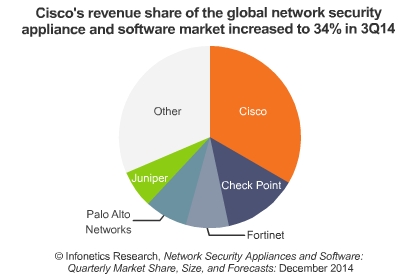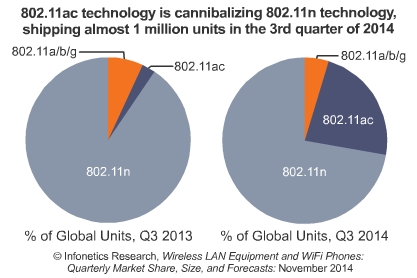Although PC renewals slowed in the commercial space, PC shipments were supported by increasing consumer demand during the back-to-school season and preparations for the Christmas sales. Consequently, PC shipments posted 23.6% growth in Western Europe in Q3, says IDC.
In the PC ranking, HP remained leader in Western Europe, followed by Lenovo and Acer, with the latter two vendors benefiting from very strong growth in consumer PC shipments. Sony and Samsung no longer rank in the top 10, following their exit from the Western European PC market. The trends seen during the previous quarter were confirmed in the third quarter of 2014: shipments of PCs continued to post an increase, with demand shifting towards desktops and portable PCs after few years of delayed renewals and with low-end consumer portable PCs driving the growth in shipments. On the other hand, tablets continued to contract as end users have not seen sufficient need to replace their devices.
The smart connected device (SCD) market posted another quarter of growth in Western Europe, driven mainly by increased demand for personal computers. According to figures published by International Data Corporation (IDC), PC, tablet, and smartphone shipments totalled 60.1 million units, with volume 8.6% higher compared with the same quarter a year ago.
Tablets declined but 2-in-1s picked up and posted 46.4% growth.
Smartphones posted 6.1% growth, driven by the increased availability of affordable smartphones and the proliferation of 4G networks.
"PC shipments in Western Europe posted another strong quarter," said Maciek Gornicki, senior research analyst, IDC EMEA Personal Computing. "After a few years of delayed renewals, consumers started to refresh their PCs again, encouraged by lower price points and attractive products offered by vendors. Shipments were also boosted by sell-in of low-end notebooks with Windows 8.1 Bing version, which are expected to drive volume during the Christmas season. On the other hand, demand started to wane in the commercial market after several quarters of strong renewals induced by the end of Windows XP support."
Jorge Ferreira, research analyst, IDC EMEA Personal Computing, added: "The tablet market reached a plateau which reflects some maturity for this technology, only four years after the popular introduction of the iPad.
"This quarter experienced a small contraction as a result of the ongoing dynamic shift among different mobile devices. Small tablets suffered from growth in phablets, whereas the overall tablet market was impacted by the price aggressiveness of a huge number of portables with MS Windows 8.1 with Bing.
"Despite disappointing growth rates in 2014, IDC expects the market to continue thriving from 2015, benefiting from continuous price erosion and innovation, as a consequence of the fierce competitive environment. In addition, the commercial segment is predicted to support market improvement, chiefly driven by the increasing adoption of 2-in-1s, which has been fostered by a wider product offering from traditional PC manufacturers and a further drop in price points."
The smartphone market is fiercely competitive as mobile phone vendors have intense interest in this space. New vendors have successfully entered the market, mainly targeting the low-end segment where growth levels are higher. The average selling price (ASP) of smartphones fell 5.5% to $433 and a downwards trajectory is expected, dropping to $317 by 2018. "Startup players are launching devices with attractive specs at very competitive prices, and users are becoming more open to new brands when they understand their value proposition," said Susana Santos, Research Analyst, IDC WE Mobile Devices.
Overall vendor ranking remained unchanged for this quarter. Samsung and Apple maintained their leadership in the overall device market, supported by large smartphone volumes and especially new product launches for Apple. Sony in the middle of this ranking suffered from the disengagement from the PC market in Europe.
The traditional PC vendors benefited from the rebound in PC, while Lenovo made some strong progress in tablets:
Samsung continued its leadership in the smartphone space in Western Europe, both by volume and value, despite a volume decline of 16.7%. Apple kept second position with a share increase from last year to 17.1%, benefitting from the long-awaited larger-screen devices launched in September. Wiko jumped to 6th position in the top smartphone vendors' ranking, reaching 3.2% market share.
During 3Q14, Apple kept the leadership in the region for tablets, despite a volume decline of 15.9% year-on-year, chiefly affected by increased tablet life cycles and the expectation of a new product launch. Samsung consolidated its position and held second place, although shipments contracted by 2.7% from the same period last year.

 The global network security appliance and software market is on track to end 2014 with strong growth - up 7% in 3Q14 from 2Q14 to $1.76bn, calculates research house Infonetics.
The global network security appliance and software market is on track to end 2014 with strong growth - up 7% in 3Q14 from 2Q14 to $1.76bn, calculates research house Infonetics.
 Maintel's new Group Sales Director Stuart Legg (pictured) is tasked with transforming the firm's sales operations following recent acquisitions.
Maintel's new Group Sales Director Stuart Legg (pictured) is tasked with transforming the firm's sales operations following recent acquisitions. Staff optimism is a competitive advantage and there's no better way to stoke up inter-company positivity than by winning a Comms Dealer Sales Award.
Staff optimism is a competitive advantage and there's no better way to stoke up inter-company positivity than by winning a Comms Dealer Sales Award. Leeds-based Diva Telecom has welcomed Hannah O'sullivan to the role of Marketing Manager.
Leeds-based Diva Telecom has welcomed Hannah O'sullivan to the role of Marketing Manager. Computacenter's UK MD of 20 years Neil Muller (pictured left) is heading to Daisy as CEO in a move that sees Matt Riley become Executive Chairman. Riley founded Daisy in 2001 and has grown the company's turnover to £350m. Muller runs Computacenter's UK business in the enterprise market and takes up his new position in February 2015 when he will focus on the mid-market in particular.
Computacenter's UK MD of 20 years Neil Muller (pictured left) is heading to Daisy as CEO in a move that sees Matt Riley become Executive Chairman. Riley founded Daisy in 2001 and has grown the company's turnover to £350m. Muller runs Computacenter's UK business in the enterprise market and takes up his new position in February 2015 when he will focus on the mid-market in particular.